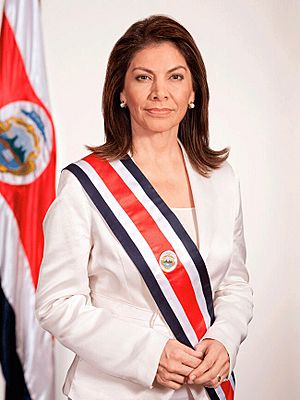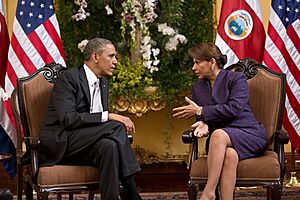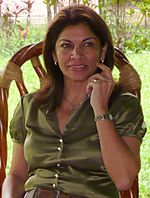Laura Chinchilla facts for kids
Quick facts for kids
Laura Chinchilla
|
|
|---|---|

Official portrait, c. 2010
|
|
| 46th President of Costa Rica | |
| In office 8 May 2010 – 8 May 2014 |
|
| Vice President | Alfio Piva Luis Liberman |
| Preceded by | Óscar Arias |
| Succeeded by | Luis Guillermo Solís |
| First-Vice President of Costa Rica | |
| In office 8 May 2006 – 8 October 2008 |
|
| President | Óscar Arias |
| Preceded by | Lineth Saborío Chaverri |
| Succeeded by | Alfio Piva |
| President pro tempore of CELAC | |
| In office 28 January 2014 – 8 May 2014 |
|
| Preceded by | Raúl Castro |
| Succeeded by | Luis Guillermo Solís |
| Minister of Justice and Grace | |
| In office 8 May 2006 – 8 October 2008 |
|
| President | Óscar Arias |
| Preceded by | Patricia Vega Herrera |
| Succeeded by | Viviana Martín Salazar |
| Minister of Public Security | |
| In office 30 March 2008 – 14 April 2008 |
|
| President | Óscar Arias |
| Preceded by | Fernando Berrocal Soto |
| Succeeded by | Janina del Vecchio Ugalde |
| In office 12 November 1996 – 8 May 1998 |
|
| President | José María Figueres |
| Preceded by | Bernardo Arce Gutiérrez |
| Succeeded by | Juan Rafael Lizano Sáenz |
| Deputy of the Legislative Assembly of Costa Rica | |
| In office 1 May 2002 – 30 April 2006 |
|
| Preceded by | Guido Monge Fernández |
| Succeeded by | Evita Arguedas Maklouf |
| Constituency | San José (13th Office) |
| Vice Minister of Public Security | |
| In office 8 May 1994 – 12 November 1996 |
|
| President | José María Figueres |
| Succeeded by | Óscar Albán Chipsen |
| Personal details | |
| Born |
Laura Chinchilla Miranda
28 March 1959 San José, Costa Rica |
| Political party | National Liberation Party (until 2022) Independent (2022-present) |
| Spouses |
|
| Children | 1 |
| Alma mater | |
| Signature |  |
Laura Chinchilla Miranda (born March 28, 1959) is a politician from Costa Rica who made history as the country's first female president. She served from 2010 to 2014. Before becoming president, she was one of two Vice-Presidents under President Óscar Arias Sánchez. She also served as the Minister of Justice.
In the 2010 election, she represented the National Liberation Party (PLN). She won the election with a large portion of the votes. On May 8, 2010, she was officially sworn in as president. She was the eighth woman to become president of a country in Latin America.
After her presidency, she began teaching at Georgetown University. Today, she is involved with important groups like the Inter-American Dialogue and the Club de Madrid, where she works with other world leaders.
Contents
Early Life and Education
Laura Chinchilla was born in San José, Costa Rica. She is the oldest of four children. Her father, Rafael Ángel Chinchilla Fallas, was a respected government official.
For her education, Chinchilla first went to the University of Costa Rica. There, she studied political science, which is the study of government and politics. She then traveled to the United States to earn a master's degree in public policy from Georgetown University. After finishing her studies, she returned to Costa Rica. She used her knowledge to work as a consultant, helping to improve the country's security and justice systems.
In 1990, she met José María Rico Cueto, a Spanish lawyer. They married in 2000 and had one son, José María Rico Chinchilla. Her husband passed away in 2019.
Start in Politics
Chinchilla began her political career working for President José María Figueres. She started as the Vice Minister of Public Security. Later, President Figueres appointed her as the Minister of Public Security. She was the first woman to ever hold that important job.
In 2002, she was elected to the Legislative Assembly of Costa Rica, which is like the country's congress. By 2006, she became the First Vice President of Costa Rica. At the same time, she was also the Minister of Justice and Peace. She left these roles in 2008 to prepare for her own presidential campaign.
2010 Presidential Campaign
When Laura Chinchilla decided to run for president, it was a surprise to some. She wasn't one of the most famous members of her political party. Many people believe that President Óscar Arias encouraged and supported her.
Campaign Promises
During her campaign, Chinchilla focused on several key issues. She wanted to improve social programs, make the economy stronger, protect the environment, and increase public safety. Her campaign slogan was firme y honesta, which means "firm and honest." This showed she was serious about fighting crime and corruption.
She promised to build 20,000 new homes for families with low incomes. She also aimed to lower unemployment and have the country use 95% renewable energy. Better roads, child care, and police services were also part of her plan.
Winning the Election
Chinchilla first had to win her party's primary election. With support from President Arias, she won easily. In the main election, her biggest opponents were Ottón Solís and Otto Guevara.
She won the presidency with about 47% of the vote. Many women and older citizens voted for her. People were drawn to her personality, her campaign ideas, and the historic chance to elect a female president.
President of Costa Rica (2010-2014)
As president, Chinchilla had to work with a legislature where her party did not have a majority. This meant she had to cooperate with other political parties to pass laws. This was sometimes challenging, as she had disagreements with both the opposition and members of her own party.
Handling a Border Dispute
In 2010, a major event of her presidency occurred when Nicaragua's military occupied a small, uninhabited island called Isla Calero. The island is located on the border between Costa Rica and Nicaragua, and both countries claimed it.
Instead of using force, President Chinchilla took the case to the International Court of Justice, a world court that helps solve disputes between countries. The court ordered both nations to leave the island. Her peaceful handling of this situation is often seen as a major success of her presidency.
Public Image and Leadership Style
President Chinchilla was known for her collaborative leadership style. She preferred to work with others to find solutions. Her supporters saw this as a strength, showing she could bring people together. Others sometimes felt it made her seem less decisive than her predecessor, President Arias, who had a more commanding style.
By the end of her term, Costa Rica faced some economic challenges. However, in 2016, the World Economic Forum recognized her as one of the most powerful women in Central America.
Key Policies and Achievements
Chinchilla's presidency focused on security, the environment, and social programs.
Crime and Security
With her background in public security, Chinchilla made safety a top priority. She believed that poverty and lack of opportunity were major causes of crime. Her government hired hundreds of new police officers and worked on both preventing crime and enforcing the law. During her time as president, the number of murders in Costa Rica went down.
Protecting the Environment

Chinchilla was a strong supporter of environmental protection. One of her first actions as president was to restore a ban on open-pit gold mining, which can harm the environment. She also set a goal for Costa Rica to be carbon neutral by 2021, meaning it would not add extra carbon dioxide to the atmosphere.
Her government also worked to protect the oceans by expanding marine protection zones and fighting against shark finning. Thanks to these efforts, over 90% of Costa Rica's electricity came from renewable sources by the end of her term.
Education and Social Programs
Education was very important to President Chinchilla. Her government increased funding for schools, reaching the highest level of investment in the region.
One of her most famous programs was the Red de Cuido (Network of Care). This program provided funding for child care and care for the elderly. It helped families by creating safe places for children and seniors while other family members were at work or school. The program was a great success and was recognized by international organizations.
Life After the Presidency
After leaving office, Laura Chinchilla did not stop working. She has taken on many important roles around the world.
She has taught at several universities, including Georgetown University in the U.S. and the University of São Paulo in Brazil. She shares her knowledge of politics and government with students.
Chinchilla is also involved with many international organizations. She has led missions to observe elections in countries like Mexico and the United States to ensure they are fair. She is the vice-president of the Club de Madrid, a group of former world leaders who work to promote democracy. She is also a member of the International Olympic Committee.
Awards and Recognition
Laura Chinchilla has received many awards for her work. She was given the “Women of the Decade in Public Life and Leadership Award” for her achievements. She also holds honorary doctorates from several universities, including the University for Peace, Georgetown University, and Kyoto University of Foreign Studies.
See also
 In Spanish: Laura Chinchilla para niños
In Spanish: Laura Chinchilla para niños
- Politics of Costa Rica
- Religion in Costa Rica
 | Frances Mary Albrier |
 | Whitney Young |
 | Muhammad Ali |


